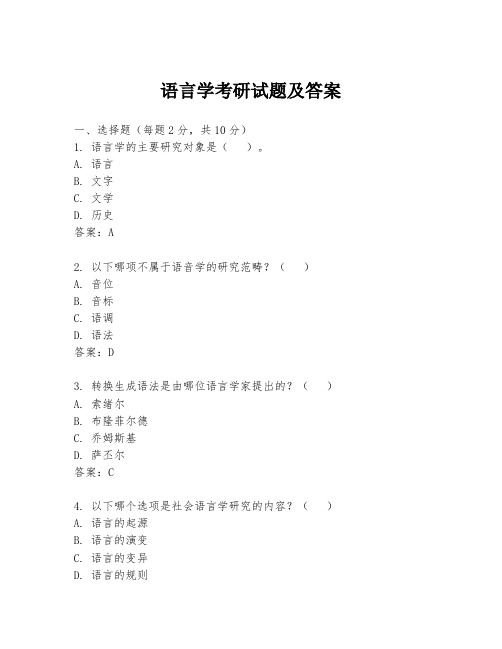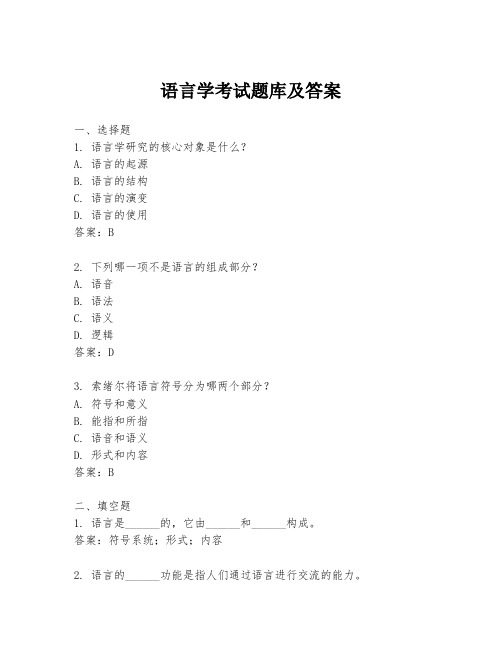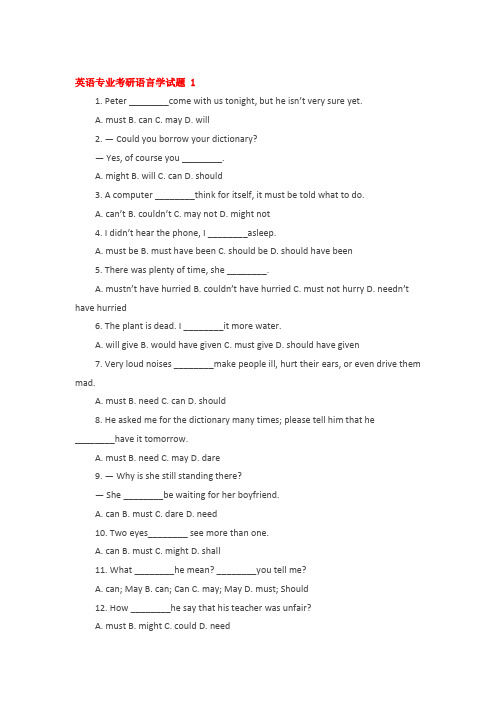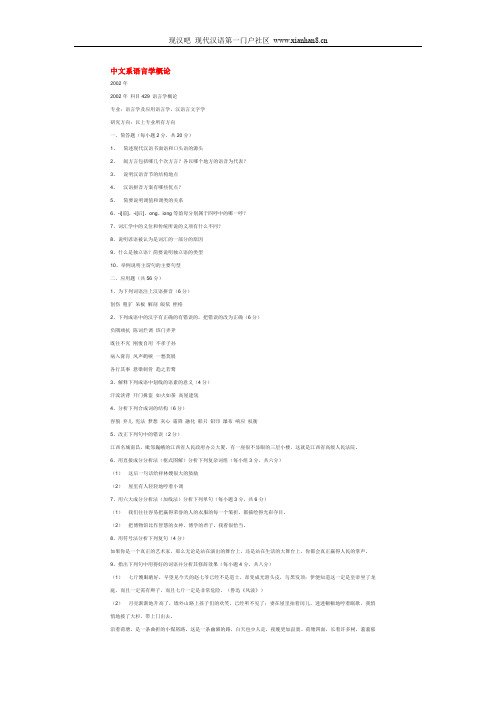语言学考研试题
语言学考研试题及答案

语言学考研试题及答案一、选择题(每题2分,共10分)1. 语言学的主要研究对象是()。
A. 语言B. 文字C. 文学D. 历史答案:A2. 以下哪项不属于语音学的研究范畴?()A. 音位B. 音标C. 语调D. 语法答案:D3. 转换生成语法是由哪位语言学家提出的?()A. 索绪尔B. 布隆菲尔德C. 乔姆斯基D. 萨丕尔答案:C4. 以下哪个选项是社会语言学研究的内容?()A. 语言的起源B. 语言的演变C. 语言的变异D. 语言的规则答案:C5. 语言接触导致的语言变化称为()。
A. 语言演变B. 语言借用C. 语言混合D. 语言分化答案:B二、填空题(每题2分,共10分)1. 语言学的三个基本分支是语音学、______和句法学。
答案:语法学2. 语言的最小意义单位是______。
答案:语素3. 一种语言的音位系统称为该语言的______。
答案:音系4. 语言的规则性体现在______。
答案:语法5. 语言的交际功能包括表达、______和指示。
答案:指称三、简答题(每题10分,共20分)1. 简述语言的任意性原则。
答案:语言的任意性原则指的是语言符号的音义结合是任意的,即语言符号的音与义之间没有自然的、必然的联系,而是由社会约定俗成的。
2. 描述语言的双重性。
答案:语言的双重性指的是语言既有形式又有内容。
形式指的是语言的音位、词汇、句法等结构;内容指的是语言所表达的意义和信息。
四、论述题(每题20分,共40分)1. 论述语言的交际功能。
答案:语言的交际功能是指语言在人际交流中的作用,主要包括以下几个方面:表达功能,即通过语言来表达个人的思想、情感和意愿;指称功能,即通过语言来指称或描述客观世界的事物和现象;社交功能,即通过语言进行社会交往,建立和维护人际关系;思维功能,即通过语言进行思考和认识世界。
2. 论述语言的演变过程。
答案:语言的演变过程是一个复杂且漫长的历史过程,包括语音、词汇、语法等方面的变化。
语言学考试题库及答案

语言学考试题库及答案一、选择题1. 语言学研究的核心对象是什么?A. 语言的起源B. 语言的结构C. 语言的演变D. 语言的使用答案:B2. 下列哪一项不是语言的组成部分?A. 语音B. 语法C. 语义D. 逻辑答案:D3. 索绪尔将语言符号分为哪两个部分?A. 符号和意义B. 能指和所指C. 语音和语义D. 形式和内容答案:B二、填空题1. 语言是______的,它由______和______构成。
答案:符号系统;形式;内容2. 语言的______功能是指人们通过语言进行交流的能力。
答案:交流3. 语言的______功能是指语言能够表达思想和情感的能力。
答案:表达三、简答题1. 简述语言和言语的区别。
答案:语言是指一种抽象的符号系统,它包括语音、语法、语义等规则和结构;言语则是指个人使用语言进行交流的具体行为。
2. 描述索绪尔的“能指”和“所指”概念。
答案:索绪尔认为语言符号由“能指”和“所指”两部分组成。
“能指”指的是语言符号的声音形式,而“所指”指的是符号所代表的概念或意义。
四、论述题1. 论述语言的任意性原则及其对语言学习和教学的影响。
答案:语言的任意性原则指的是语言符号的声音形式和它所代表的概念之间没有必然的联系。
这一原则对语言学习和教学有着深远的影响,因为它意味着学习者需要记忆每个符号的声音和意义之间的联系,而不能依赖于逻辑或直观的关联。
这对语言教学提出了挑战,要求教师设计有效的教学方法来帮助学生记忆和理解这些任意的联系。
2. 分析语言的交际功能及其在现代社会中的重要性。
答案:语言的交际功能是指语言作为交流工具,使人们能够传递信息、表达情感和进行社会互动。
在现代社会,随着全球化和信息技术的发展,语言的交际功能变得尤为重要。
有效的沟通能够促进国际合作、文化交流和商业交易,同时也有助于解决社会冲突和增进理解。
因此,掌握一门或多门语言对于个人和社会的发展至关重要。
英语专业考研语言学试题

英语专业考研语言学试题 11. Peter ________come with us tonight, but he isn’t very sure yet.A. mustB. canC. mayD. will2. — Could you borrow your dictionary?— Yes, of course you ________.A. mightB. willC. canD. should3. A computer ________think for itself, it must be told what to do.A. can’tB. couldn’tC. may notD. might not4. I didn’t hear the phone, I ________asleep.A. must beB. must have beenC. should beD. should have been5. There was plenty of time, she ________.A. mustn’t have hurriedB. couldn’t have hurriedC. must not hurryD. needn’t have hurried6. The plant is dead. I ________it more water.A. will giveB. would have givenC. must giveD. should have given7. Very loud noises ________make people ill, hurt their ears, or even drive them mad.A. mustB. needC. canD. should8. He asked me for the dictionary many times; please tell him that he________have it tomorrow.A. mustB. needC. mayD. dare9. — Why is she still standing there?— She ________be waiting for her boyfriend.A. canB. mustC. dareD. need10. Two eyes________ see more than one.A. canB. mustC. mightD. shall11. What ________he mean? ________you tell me?A. can; MayB. can; CanC. may; MayD. must; Should12. How ________he say that his teacher was unfair?A. mustB. mightC. couldD. need13. It ________be very cold in this part.A. canB. oughtC. shallD. dare14. I’d like to ask a question if I ________.A. mustB. willC. mayD. might15. Even in summer the temperature ________suddenly drop below freezing.A. mightB. oughtC. mustD. need16. He decided to join the army so that he ________defend the country.A. may helpB. might helpC. helpsD. helped17. You ________always be talking like that.A. mightn’tB. mayn’tC. can’tD. mustn’t18. The car ________have broke down just when we were about to start off.A. mustB. couldC. mightD. should19. You ________see him while he is in hospital.A. have betterB. had betterC. would ratherD. had to20. There is a fine sunset; it ________to be a fine day tomorrow.A. oughtB. shouldC. has toD. has better21. You are his father, you ________take care of him.A. mightB. oughtC. ought toD. are able to22. That’s all. It ________be talked about any more.A. needn’tB. mightn’tC. darn’t toD. needn’t to23. The question ________discussing.A. needsB. needC. can beD. must be24. He ________even look out of the window.A. daren’tB. daresn’tC. dared not toD. dares not25. I’m so hungry that I ________find something to eat.A. have toB. wouldC. mayD. can26. All the students ________do their best for the modernization of our country.A. canB. shouldC. mayD. might27. You ________be careful with your homework.A. mustB. have toC. mayD. are used to28. It is getting darker. You ________not go home.A. had betterB. have betterC. would ratherD. would like29. I ________what happened to our school.A. would like knowB. would like to knowC. would like knowingD. would like that I know30. — Would you mind my changing the plan?— ________.A. Oh, no, pleaseB. Yes, I mind notC. No, I wouldD. Yes, I will31. — It ________ be Jack who is in the library.—I’m sure it ________be him, I saw him off at the railway station just two days ago.A. can’t; can’t eB. must; mustn’tC. must; can’tD. can’t; mustn’t32. I ________tell her the truth about his marriage.A. can’t helpB. can’t butC. may not helpD. mustn’t but33. Since she is angry, we ________.A. had better to leave her alongB. should leave her aloneC. would rather to leave her aloneD. must leave her alone34. Look! What you’ve done to me. You ________more careful.A. maybeB. had toC. should have beenD. would be35. ________read the letter for you?A. Would you like meB. Do you want meC. Will you mind meD. Shall I36. He promised he ________not make such silly mistakes.A. wouldB. shouldC. mightD. could37. ________it be true that his father will go abroad?A. CanB. MayC. NeedD. Should38. Those streams are so small that they ________be shown in the maps.A. mustn’tB. may notC. can’tD. may39. — May I use your bike?— ________.A. No, you may notB. No, you mustn’tC. No, you won’tD. Sorry, I’m afraid not40. — Must I write to her?— No, you ________.A. mustn’tB. shouldn’tC. can’tD. don’t have to41. — Need I start tonight?— Yes, you ________.A. doB. needC. mustD. may42. The old man ________sit for hours watching the ships.A. wouldB. shouldC. was used toD. would rather to43. If the telephone ________ring, please wake me up.A. wouldB. shouldC. willD. might44. I wish they ________stop making remarks about me.A. wouldB. willC. shouldD. shall45. You’re thirsty, aren’t you? ________he get some coffee?A. DoesB. ShallC. WouldD. Let46. Which of the following is wrong?A. That may be true.B. That might be true.C. That can be true.D. That could be true.47. — Would you lend me some money?— Yes, I ________.A. wouldB. willC. canD. may48. He ________ swimming when he was young.A. was used to goB. got used to goC. used to goingD. used to go49. You say you ________ not do it, but I say you ________do it.A. will; shallB. shall; shallC. shall; willD. will; will50. You ________out yesterday without a coat. No wonder you caught cold.A. should have goneB. shouldn’t have goneC. could not have goneD. might have gone51. He ________the 8:30 train because he didn’t leave home until 9:00.A. can’t catchB. couldn’t catchC. may notD. can’t have caught52. You ________us this because we had more than enough.A. needn’t bringB. needn’t have broughtC. mustn’t bringD. couldn’t have brought53. — He learnt the language in three months.— He ________very hard.A. must workB. might have workedC. must have workedD. might work54. — Who told you my telephone number?—I don’t remember. It ________Mary.—It can’t be Mary, she doesn’t know it.A. may have beenB. can have beenC. must beD. can be55. You ________him, why didn’t you?A. ought to thankB. ought have thankedC. ought to have thankedD. ought thank56. I ________have arrived a little earlier, but my car broke down.A. shouldB. couldC. canD. can’t57. — ________we go out for a walk?—Great. Let’s goA. ShallB. WillC. MayD. Should58. Though she was seriously ill, she ________ complete the work in time.A. wouldB. was able toC. was possible toD. might59. — Would you like to play chess with me?— Yes, ________.A. I’dB. I wouldC. I’d likeD. I’d like to60. Tom is late. He ________the wrong bus.A. must takeB. must have takenC. might takeD. could take英语专业考研语言学试题 21. Charles Babbage is generally considered ________the first computer.A. to have inventedB. inventingC. to inventD. having invented2. Little Jim should love ________to the theatre this evening.A. to be takenB. to takeC. being takenD. taking3. — I usually go there by train.— Why not ________by boat for a change?A. to try goingB. trying to goC. to try and goD. try going4. John was made ________the truck for a week as a punishment.A. to washB. washingC. washD. to be washing5. She reached the top of the hill and stopped ________on a big rock by the side of the path.A. to have restedB. restingC. to restD. rest6. She pretended________ me when I passed by.A. not to seeB. not seeingC. to not seeD. having not seen7. Though he had often made his sister ________, today he was made________by his sister.A. cry; to cryB. crying; cryingC. cry; cryingD. to cry; cry8. Tell him ________the window.A. to shut notB. not to shutC. to not shutD. don’t’ shut9. ________her sick to think of the matter.A. That madeB. That causedC. It madeD. It caused10. The woman’s job is ________after the disable children.A. lookB. looksC. lookedD. to look11. She ________to ________everything.A. demanded; tellB. demanded; be toldC. required; tellD. required; be told12. It’s time ________our league meeting.A. to beginB. beginningC. that we beginD. that we’ll begin13. That day I was the last one ________the experiment.A. madeB. makingC. to makeD. having made14. I’m hungry. Get me something ________.A. to be eatenB. to eatC. eatingD. to be eating15. Would you ________me to show you around the place?A. letB. likeC. mindD. care16. She is said ________the necklace.A. that she lostB. that she has lostC. to loseD. to have lost17. What do you think is the best way ________the problem?A. to settlingB. in which settlingC. to settleD. settling18. You are ________retell the story.A. oughtB. ought toC. expectingD. expected to19. I didn’t want the problem ________again.A. to raiseB. to be raisedC. being raisedD. be raised20. Have you had the nurse ________your son’s temperature?A. to takeB. takingC. takeD. taken21. First we should find a hotel ________for the night.A. to put up at itB. in order to put up atC. at where to put upD. at which to put up22. ________wake me up when you come in.A. You’d better not toB. You’d better notC. You hadn’t better toD. You hadn’t better23. I don’t think you need ________ today.A. to leaveB. to be leavingC. leavingD. being left24. We have been looking for the girl all the morning, but she is no where________.A. to seeB. to be seenC. being seenD. seen25. He should ________for what he has done.A. praiseB. be praisedC. have praisedD. to be praised26. He felt a stone ________his back.A. hittingB. to hitC. hittedD. hit27. I hurried to school, only ________out it was Sunday.A. findB. to findC. foundD. would find28. Here are some exercises that need________ after class.A. doneB. to be doneC. being doneD. to do29. I’ve been waiting for half an hour ________me the phone call.A. to giveB. for you givingC. of you to giveD. for you to give30. Everything ________smoothly.A. seems goingB. seems to be goingC. is seeming to goD. is seeming to be going31. It was thoughtful ________us the map of the city.A. of you to sendB. for you to sendC. of you sendingD. for you sending32. You are fortunate ________as a member of the club.A. being acceptedB. to acceptC. To have acceptedD. to have been accepted33. ________wasn’t pleasant ________up so early.A. He; to wakeB. He; to be wakenC. It; of him to wakeD. It; to be woken34. I find these problems are easy________.A. to work outB. to be worked outC. in working outD. to be worked them out35. How rude ________him ________a child like that.A. of; to treatB. for; to treatC. of; is to treatD. for; is to treat36. It was stupid ________him ________attend the lecture.A. of; to notB. of; not toC. for; to notD. for; not to37. It was impossible ________lost time to ________.A. for; make upB. of; make upC. for; be made upD. of; be made up38. The shoes are too large ________.A. to me to wearB. for me to wearC. to me to be wornD. for me to be worn39. ________was sorry________ made such a silly mistake.A. It; to haveB. It; havingC. I ; to haveD. I; having40. I’ll be delighted ________.A. when I’ll see you againB. to see you againC. that I see you againD. to have seen you again41. He was ________tired ________any further.A. too; walkingB. too; to walkC. so; walkingD. so; to walk42. Will you be ________kind ________make tea for me?A. so; toB. fairly; toC. so; as toD. fairly; as to43. The chair looks rather hard, but in fact it is very comfortable to ________.A. sitB. sit onC. be satD. be sat on44. I ________how to answer the question.A. puzzleB. am puzzlingC. have puzzledD. am puzzled45. Have you decided ________the party?A. whether you holdB. why to holdC. whether to holdD. if to hold46. He doesn’t know ________to stay or not.A. ifB. eitherC. neitherD. whether he ought47. Last summer I took a course on ________.A. how to make dressesB. how dresses be madeC. how to be made dressesD. how dresses to be made48. He hesitated ________ the medicine.A. takingB. about to takeC. whether he takeD. whether to take49. How do the birds know exactly ________ direction ________?A. which, flyingB. which; to fly toC. in which; to flyD. X; flying to50. —I don’t know ________with the problem.— Why not ________your teacher for advise?A. what to do; to askB. how to do; to askC. what to do; askD. how to do; ask51. I think he should get a job, but you can’t force him ________ if he’s not ready ________.A. to get; toB. to get; XC. to; X D; to; to do52. — Would you like to go to the ball?— Yes, ________.A. I’dB. I’d likeC. I’d like toD. I’d like to go53. —Aren’t you in charge of this?— No, and I ________.A. don’t wantB. don’t want toC. don’t want to be D am not54. ________the truth, I don’t want to go.A. To tellB. TellC. TellingD. In order to tell55. I’d rather read something at home than ________to the park in such weather.A. goB. to goC. goingD. went56. We could do nothing but ________Father for help.A. askB. askingC. to askD. asked57. He wanted nothing but ________in the corner.A. seatB. be seatedC. be seatD. to be seated58. It ________about two years________ such a big dam.A. takes; in buildingB. takes; to buildC. needs; in buildingD. needs; to build59. How much did ________cost ________the house?A. it; in rebuildingB. he; in rebuildingC. it; to rebuildD. he; to rebuild60. ________requires patience ________a good nurse.A. She; to beB. she; if she isC. It; to beD. It; if she is。
语言学考研真题大全(共13套)

中文系语言学概论2002年2002年科目429 语言学概论专业:语言学及应用语言学、汉语言文字学研究方向:以上专业所有方向一、简答题(每小题2分,共20分)1、简述现代汉语书面语和口头语的源头2、闽方言包括哪几个次方言?各以哪个地方的语音为代表?3、说明汉语音节的结构地点4、汉语拼音方案有哪些优点?5、简要说明调值和调类的关系6、-i[前]、-i[后]、ong、iong等韵母分别属于四呼中的哪一呼?7、词汇学中的义位和传统所说的义项有什么不同?8、说明谚语被认为是词汇的一部分的原因9、什么是独立语?简要说明独立语的类型10、举例说明主谓句的主要句型二、应用题(共56分)1、为下列词语注上汉语拼音(6分)创伤粗犷呆板解剖皈依桎梏2、下列成语中的汉字有正确的有错误的,把错误的改为正确(6分)负隅顽抗陈词烂调班门弄斧既往不究刚愎自用不孝子孙病入膏肓风声鹤唳一愁莫展各行其事悬梁刺骨趋之若鹜3、解释下列成语中划线的语素的意义(4分)汗流浃背开门揖盗如火如荼高屋建瓴4、分析下列合成词的结构(6分)容貌弃儿宪法梦想灰心霜降融化船只铅印瀑布响应权衡5、改正下列句中的错误(2分)江西名城南昌,毗邻巍峨的江西省人民政府办公大厦,有一座很不显眼的三层小楼,这就是江西省高级人民法院。
6、用直接成分分析法(框式图解)分析下列复杂词组(每小组3分,共六分)(1)这后一句话给祥林嫂很大的鼓励(2)屋里有人轻轻地哼着小调7、用六大成分分析法(加线法)分析下列单句(每小题3分,共6分)(1)我们往往容易把赢得荣誉的人的衣服的每一个皱折,都描绘得光彩夺目。
(2)把博物馆比作智慧的女神、博学的君子,我看很恰当。
8、用符号法分析下列复句(4分)如果你是一个真正的艺术家,那么无论是站在演出的舞台上,还是站在生活的大舞台上,你都会真正赢得人民的掌声。
9、指出下列句中用得好的词语并分析其修辞效果(每小题4分,共八分)(1)七斤嫂眼睛好,早望见今天的赵七爷已经不是道士,却变成光滑头皮,乌黑发顶;伊便知道这一定是皇帝坐了龙庭,而且一定需有辫子,而且七斤一定是非常危险。
语言学考研真题及答案

语言学考研真题及答案一、语音学部分以下是2019年语言学考研真题及答案的整理:题目一:下列哪个选项中的音素是塞音?A. [h]B. [p]C. [r]D. [m]答案:B. [p]题目二:下列哪个选项中的音素是元音?A. [s]B. [l]C. [i]D. [t]答案:C. [i]题目三:下列哪个选项中的音素是鼻音?A. [k]B. [n]C. [g]D. [w]答案:B. [n]二、语法学部分以下是2020年语言学考研真题及答案的整理:题目一:下列短语中,哪个可以作为主语?A. "在公园里跑步"B. "喜欢读书的人"C. "听音乐"D. "为他做饭"答案:B. "喜欢读书的人"题目二:下列短语中,哪个可以作为宾语?A. "开心地唱歌"B. "漂亮的花园"C. "给他礼物"D. "在海边散步"答案:C. "给他礼物"题目三:下列短语中,哪个可以作为定语?A. "跳舞的小孩"B. "在教室里学习"C. "大声地喊"D. "看电影"答案:A. "跳舞的小孩"三、语义学部分以下是2018年语言学考研真题及答案的整理:题目一:下列哪个词汇与“快乐”具有相似的意义?A. "悲伤"B. "生气"C. "开心"D. "愤怒"答案:C. "开心"题目二:下列哪个词汇与“大”具有相反的意义?A. "小"B. "长"C. "高"D. "短"答案:A. "小"题目三:下列哪个词汇与“美丽”具有近义词的关系?A. "丑陋"B. "普通"C. "漂亮"D. "丰富"答案:C. "漂亮"综上所述,以上是语言学考研真题及答案的简要整理。
语言学考研试题及答案

语言学考研试题及答案语言学考研模拟试题一、单项选择题(每题2分,共20分)1. 下列哪项不是语言的基本功能?()A. 信息传递B. 情感表达C. 逻辑推理D. 社交互动2. 结构主义语言学的奠基人是()。
A. 索绪尔B. 乔姆斯基C. 布隆菲尔德D. 萨丕尔3. 在语言学中,音位和音素的区别在于()。
A. 音位是具体的,音素是抽象的B. 音位是抽象的,音素是具体的C. 音位和音素都是具体的D. 音位和音素都是抽象的4. 下列哪项不是生成语法理论的核心概念?()A. 深层结构B. 表层结构C. 转换规则D. 语言行为5. 语言的任意性原则是由哪位语言学家提出的?()A. 索绪尔B. 乔姆斯基C. 布隆菲尔德D. 萨丕尔6. 在语义学中,词义的最小意义单位是()。
A. 语素B. 词汇C. 短语D. 句子7. 下列哪项不是社会语言学研究的内容?()A. 语言变异B. 语言与性别C. 语言与年龄D. 语言的生物学基础8. 语言的同化现象通常是指()。
A. 语言的消亡B. 语言的创新C. 语言的借用D. 语言的统一9. 下列哪项是语言接触的结果?()A. 语言的分化B. 语言的融合C. 语言的独立发展D. 语言的隔离10. 在语言学中,词汇-功能语法是由哪位学者提出的?()A. 韩礼德B. 乔姆斯基C. 布隆菲尔德D. 萨丕尔二、简答题(每题10分,共20分)1. 简述语言的萨丕尔-沃尔夫假说。
2. 描述一下什么是形态学,并给出一个例子。
三、论述题(每题30分,共60分)1. 论述语言的普遍语法理论及其对语言习得的影响。
2. 分析社会语言学中的“语言变异”现象,并讨论其对语言研究的意义。
参考答案:一、单项选择题1. C2. A3. B4. D5. A6. A7. D8. C9. B10. A二、简答题1. 萨丕尔-沃尔夫假说,又称为语言相对论,是由语言学家爱德华·萨丕尔和他的学生本杰明·李·沃尔夫提出的。
语言学专八考研真题及答案
专八语言集锦(05年——14年专八真题及解析归纳)目录1、2005年 (1)2、2006年 (2)3、2007年 (4)4、2008年 (6)5、2009年 (8)6、2010年 (10)7、2011年 (11)8、2012年 (12)9、2013年 (13)10、2014年 (14)11、附加语言学考研题 (15)2005年38.(考查点:main branches of linguistics) Syntax is the study ofA. language functionsB. sentence structuresC. textual organizationD.word formation答案:B。
解析:Syntax is about principles of forming and understanding correct English sentences,是关于形成和理解正确英语句子的原则。
也就是句子结构。
故选择B。
39.(考察点:design features of language) Which of ale following is NOTa distinctive feature of human language?A. ArbitrarinessB. ProductivityC. Cultural transmissionD. Finiteness答案:D。
解析:题问下面四个选项中,哪一个不是人类语言的主要特征?除Finiteness(有限性)外,选项中的其它的三项Arbitrariness(任意性),Productivity(能产性)和Cultural transmission(文化传递性)在语言学概述部分都提到了。
故选择D。
40. (考察点:人物)The speech act theory was first put forward byA. John SearleB. John AustinC. Noam ChomskyD. M.A,K. Halliday答案:B。
语言学基础考研试题真题
语言学基础考研试题真题语言学基础考研试题真题语言学是研究语言的科学,它涉及到语言的结构、语音、语义、语用等方面。
对于语言学专业的考研学生来说,掌握语言学基础知识是非常重要的。
下面,我们来看一些语言学基础考研试题的真题,帮助大家更好地理解和应用语言学的知识。
第一题:下列哪个是语言学的基本研究对象?A. 语言的语音、语义、语用等方面B. 语言的历史演变和发展C. 语言的地理分布和语系关系D. 语言的社会和文化背景这道题考察的是语言学的基本研究对象。
语言学主要研究语言的结构、语音、语义、语用等方面,因此选项A是正确答案。
第二题:下列哪个学派主张语言是人类思维的产物?A. 结构主义B. 生成语法学C. 语用学D. 社会语言学这道题考察的是不同语言学学派的观点。
生成语法学主张语言是人类思维的产物,因此选项B是正确答案。
第三题:下列哪个属于语言的语音层面?A. 词汇B. 语法C. 语音D. 语义这道题考察的是语言的不同层面。
语音层面主要研究语言的音素、音节等方面,因此选项C是正确答案。
第四题:下列哪个是语言的基本单位?A. 词B. 句子C. 短语D. 字母这道题考察的是语言的基本单位。
句子是语言的基本单位,因此选项B是正确答案。
第五题:下列哪个学派主张语言是社会文化的产物?A. 结构主义B. 生成语法学C. 语用学D. 社会语言学这道题考察的是不同语言学学派的观点。
社会语言学主张语言是社会文化的产物,因此选项D是正确答案。
通过以上几道试题的解答,我们可以看出语言学的基础知识包括语言的结构、语音、语义、语用等方面的研究,同时还涉及到语言的历史演变和发展、地理分布和语系关系、社会和文化背景等方面的内容。
掌握这些基础知识对于语言学专业的考研学生来说是非常重要的。
除了掌握基础知识,考生还需要了解不同语言学学派的观点和理论。
不同的学派对于语言的起源、发展和使用等方面有不同的解释和研究方法。
对于考生来说,了解这些不同的观点和理论,可以帮助他们更好地理解和应用语言学的知识。
语言学Pragmatics相关考研真题
PragmaticsI. 名词解释1.(武汉大学2002,同济大学2000年考题)Compare and contrast the terms: illocutionary act and perlocutionary act考点分析:比较行事行为和取效行为的异同。
Answer: J.L. Austin suggests three basic senses in which in saying something one is doing something. They are locutionary acts, illocutionary acts, and perlocutionary acts. An illocutionary act is the act of expressing the speaker’s intention; it is the act perform ed in saying something. A perlocutionary act is the act performed by or resulting from saying something; it is the consequence of, or the change brought about by the utterance; it is the act performed by saying something. Take the sentence You have left the door open.The illocutionary act performed by the speaker is that by making such an utterance he has expressed his intention of speaking, i.e. asking someone to close the door, or making a complaint, depending on the context. The perlocutionary act refers to the effect of the utterance. If the hearer gets the speaker’s me ssage and sees that the speaker means to tell him to close the door, the speaker has successfully brought about the change in the real world he has intended to; then the perlocutionary act is successfully performed.II. 判断正误1.(上海外国语大学2000年考题)The Cooperative Principle, an important pragmatic principleproposed by P. Grice, aims to explain we mean more than we say.考点分析:合作原则的实质Answer: T2. (上海外国语大学2000年考题)A sentence is a grammatical unit and an utterance is a pragmatic notion.考点分析:考查句子和语句的区别Answer: T3. (上海外国语大学2000年考题) According to Searle’s classification of speech acts, “request”, “order”, “suggest”and “advice”all belong to the same general class because they are all intended by the speaker to get the hearer to do something.考点分析:考查某些词是否属于同一类言语行为。
语言学基础考研试题真题
语言学基础考研试题真题一、选择题1. 中国古代语言学代表人物是:A. 晏殊B. 邵雍C. 王士禛D. 王先生2. 下列哪个不属于语音学的范畴:A. 语音结构B. 语音形态C. 语音运动学D. 语音声学3. 现代汉语的音韵学体系是由谁主持制定的?A. 邵雍B. 王士禛C. 范仲淹D. 周敦颐4. “研究语言的本质和规律,以及语言与人类思维、文化之间的关系”是属于哪个语言学分支的定义?A. 句法学B. 语音学C. 语义学D. 语用学5. 语音学中,将语言单位按照元音和辅音的基本区别分为两类,这种分类叫做:A. 音位学B. 语音学C. 认知语言学D. 语音形态学二、判断题1. 语言学的研究对象是语言的音、形、意、用四个方面。
()2. 语音学是研究语言的目的、功能、性质以及语音在人类思维中的地位和作用。
()3. 汉字是音旁与形旁的结合。
()4. 双音节词是汉语中较少见的词语类型。
()5. 语言学研究范畴之一的句法学主要研究句子的结构、分类和变化规律。
()三、简答题1. 什么是语音学?2. 解释一下音素和音位。
3. 解释一下语言的形态学和句法学。
4. 用语音学术语解释音调和音高的关系。
5. 语义学的研究对象是什么?四、论述题请根据你所学的语言学基础知识,简要论述语音学、形态学、句法学、语义学以及音韵学的研究对象和方法,并论述它们对语言学研究的意义。
以上为语言学基础考研试题真题,希望能对语言学的学习和学术研究有所帮助。
